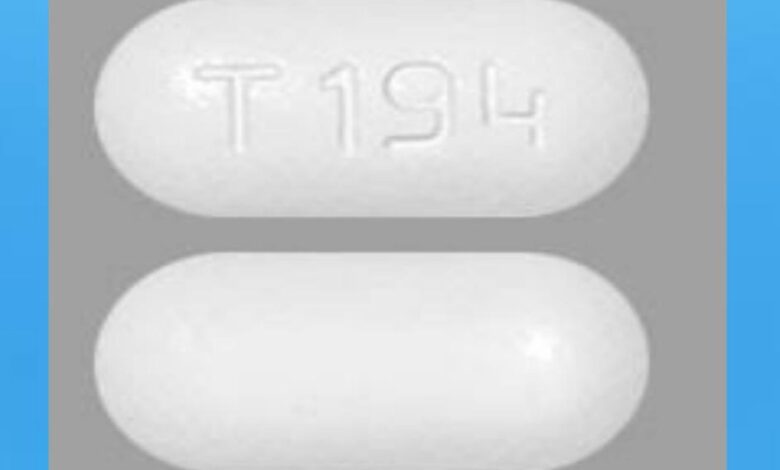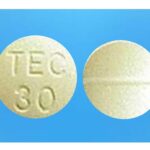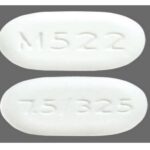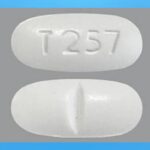T194 Pill: Uses, Dosage, Side Effects, Addiction

The capsule-shape white pill with the imprint T 194 has been identified as Acetaminophen and Oxycodone Hydrochloride 325 mg / 10 mg supplied by Camber Pharmaceuticals, Inc.. Oxycodone and acetaminophen combination is used to relieve pain severe enough to require opioid treatment and when other pain medicines did not work well enough or cannot be tolerated.
Acetaminophen is used to relieve pain and reduce fever in patients. It does not become habit-forming when taken for a long time. But acetaminophen may cause other unwanted effects when taken in large doses, including liver damage.
Oxycodone belongs to the group of medicines called narcotic analgesics (pain medicines). It acts on the central nervous system (CNS) to relieve pain.
When oxycodone is used for a long time, it may become habit-forming, causing mental or physical dependence. However, people who have continuing pain should not let the fear of dependence keep them from using narcotics to relieve their pain. Mental dependence (addiction) is not likely to occur when narcotics are used for this purpose. Physical dependence may lead to withdrawal side effects if treatment is stopped suddenly. However, severe withdrawal side effects can usually be prevented by gradually reducing the dose over a period of time before treatment is stopped completely.
Frequently, oxycodone and acetaminophen are combined to achieve pain relief. T194 pill is used to treat moderate to severe pain. This medicine may be used for other purposes; ask your health care provider or pharmacist if you have questions.
T194 pill is a prescription only medication that belongs to the drug class narcotic analgesic combinations it is classified as a Schedule 2 controlled substance under the Controlled Substance Act (CSA.)
How should I take T194 pill?
Take this medicine by mouth with a full glass of water. Follow the directions on the prescription label. You can take it with or without food. If it upsets your stomach, take it with food. Take your medicine at regular intervals. Do not take it more often than directed.
A special MedGuide will be given to you by the pharmacist with each prescription and refill. Be sure to read this information carefully each time.
Talk to your pediatrician regarding the use of this medicine in children. Special care may be needed.
Overdosage: If you think you have taken too much of this medicine, contact a poison control center or emergency room at once.
What if I miss a dose?
If you miss a dose, take it as soon as you can. If it is almost time for your next dose, take only that dose. Do not take double or extra doses.
What side effects may I notice from receiving this medicine?
Side effects that you should report to your doctor or health care professional as soon as possible:
- allergic reactions like skin rash, itching or hives, swelling of the face, lips, or tongue
- breathing problems
- confusion
- redness, blistering, peeling or loosening of the skin, including inside the mouth
- signs and symptoms of liver injury like dark yellow or brown urine; general ill feeling or flu-like symptoms; light-colored stools; loss of appetite; nausea; right upper belly pain; unusually weak or tired; yellowing of the eyes or skin
- signs and symptoms of low blood pressure like dizziness; feeling faint or lightheaded, falls; unusually weak or tired
- trouble passing urine or change in the amount of urine
Side effects that usually do not require medical attention (report to your doctor or health care professional if they continue or are bothersome):
- constipation
- dry mouth
- nausea, vomiting
- tiredness
This list may not describe all possible side effects of T194 pill. Call your doctor for medical advice about side effects. You may report side effects to FDA at 1-800-FDA-1088.
What may interact with T194 pill?
T194 pill may interact with the following medications:
- alcohol
- antihistamines for allergy, cough and cold
- antiviral medicines for HIV or AIDS
- atropine
- certain antibiotics like clarithromycin, erythromycin, linezolid, rifampin
- certain medicines for anxiety or sleep
- certain medicines for bladder problems like oxybutynin, tolterodine
- certain medicines for depression like amitriptyline, fluoxetine, sertraline
- certain medicines for fungal infections like ketoconazole, itraconazole, voriconazole
- certain medicines for migraine headache like almotriptan, eletriptan, frovatriptan, naratriptan, rizatriptan, sumatriptan, zolmitriptan
- certain medicines for nausea or vomiting like dolasetron, ondansetron, palonosetron
- certain medicines for Parkinson’s disease like benztropine, trihexyphenidyl
- certain medicines for seizures like phenobarbital, phenytoin, primidone
- certain medicines for stomach problems like dicyclomine, hyoscyamine
- certain medicines for travel sickness like scopolamine
- diuretics
- general anesthetics like halothane, isoflurane, methoxyflurane, propofol
- ipratropium
- local anesthetics like lidocaine, pramoxine, tetracaine
- MAOIs like Carbex, Eldepryl, Marplan, Nardil, and Parnate
- medicines that relax muscles for surgery
- methylene blue
- nilotinib
- other medicines with acetaminophen
- other narcotic medicines for pain or cough
- phenothiazines like chlorpromazine, mesoridazine, prochlorperazine, thioridazine
This list may not describe all possible interactions. Give your health care provider a list of all the medicines, herbs, non-prescription drugs, or dietary supplements you use. Also tell them if you smoke, drink alcohol, or use illegal drugs. Some items may interact with your medicine.
T194 Pill Safety Information
It is very important that your doctor check your progress while you are taking T194 pill, especially within the first 24 to 72 hours of treatment. This will allow your doctor to see if the medicine is working properly and to decide if you should continue to take it. Blood and urine tests may be needed to check for unwanted effects.
It is against the law and dangerous for anyone else to use your T194 pill. Keep your unused medicine in a safe and secure place. People who are addicted to drugs might want to steal it.
T194 pill will add to the effects of alcohol and other CNS depressants (medicines that can make you drowsy or less alert). Some examples of CNS depressants are antihistamines or medicine for allergies or colds, sedatives, tranquilizers, or sleeping medicine, other prescription pain medicine or narcotics, medicine for seizures or barbiturates, muscle relaxants, or anesthetics, including some dental anesthetics. Also, there may be a greater risk of liver damage if you drink three or more alcoholic beverages while you are taking acetaminophen. Do not drink alcoholic beverages, and check with your doctor before taking any of these medicines while you are using this medicine.
T194 pill may be habit-forming. If you feel that the medicine is not working as well, do not use more than your prescribed dose. Call your doctor for instructions.
Do not use T194 pill if you are using or have used an MAO inhibitor (eg, isocarboxazid [Marplan®], linezolid [Zyvox®], phenelzine [Nardil®], selegiline [Eldepryl®], tranylcypromine [Parnate®]) within the past 14 days. Using these medicine together may cause serious unwanted effects.
T194 pill may cause sleep-related breathing problems (eg, sleep apnea, sleep-related hypoxemia). Your doctor may decrease your dose if you have sleep apnea (stop breathing for short periods during sleep) while using this medicine.
Dizziness, lightheadedness, or fainting may occur when you get up suddenly from a lying or sitting position. Getting up slowly may help lessen this problem. Also, lying down for a while may relieve the dizziness or lightheadedness.
This medicine may make you dizzy, drowsy, or lightheaded. Do not drive or do anything else that could be dangerous until you know how this medicine affects you.
Check with your doctor right away if you have pain or tenderness in the upper stomach, pale stools, dark urine, loss of appetite, nausea, unusual tiredness or weakness, or yellow eyes or skin. These could be symptoms of a serious liver problem.
Serious skin reactions can occur with this medicine. Check with your doctor right away if you have blistering, peeling, or loosening of the skin, red skin lesions, severe acne or skin rash, sores or ulcers on the skin, or fever or chills while you are using this medicine.
T194 pill may cause serious allergic reactions, including anaphylaxis, which can be life-threatening and requires immediate medical attention. Call your doctor right away if you have a rash, itching, hoarseness, trouble breathing, trouble swallowing, or any swelling of your hands, face, or mouth while you are using this medicine.
Using narcotics for a long time can cause severe constipation. To prevent this, your doctor may direct you to take laxatives, drink a lot of fluids, or increase the amount of fiber in your diet. Be sure to follow the directions carefully, because continuing constipation can lead to more serious problems.
If you have been using this medicine regularly for several weeks or longer, do not change your dose or suddenly stop using it without checking with your doctor. Your doctor may want you to gradually reduce the amount you are using before stopping it completely. This may help prevent worsening of your condition and reduce the possibility of withdrawal symptoms, such as stomach cramps, anxiety, fever, irritability, nausea, restlessness, runny nose, sweating, tremors, or trouble with sleeping.
Using this medicine while you are pregnant may cause serious unwanted effects, including neonatal withdrawal syndrome in your newborn baby. Tell your doctor right away if you think you are pregnant or if you plan to become pregnant while using this medicine.
For nursing mothers:
- Talk to your doctor if you have any questions about taking oxycodone or about how this medicine may affect your baby.
- Call your doctor if you become extremely tired and have difficulty caring for your baby.
- Your baby should generally nurse every 2 to 3 hours and should not sleep for more than 4 hours at a time.
- Check with your doctor or hospital emergency room immediately if your baby shows signs of increased sleepiness (more than usual), difficulty breastfeeding, difficulty breathing, or limpness. These may be symptoms of an overdose and need immediate medical attention.
Before you have any medical tests, tell the medical doctor in charge that you are taking this medicine. The results of some tests may be affected by this medicine.
Check with your doctor right away if you have anxiety, restlessness, a fast heartbeat, fever, sweating, muscle spasms, twitching, nausea, vomiting, diarrhea, or see or hear things that are not there. These may be symptoms of a serious condition called serotonin syndrome. Your risk may be higher if you also take certain other medicines that affect serotonin levels in your body.
Using too much of this medicine may reduce infertility (unable to have children). Talk with your doctor before using this medicine if you plan to have children.
Do not take other medicines unless they have been discussed with your doctor. This includes prescription or nonprescription (over-the-counter [OTC]) medicines and herbal or vitamin supplements.





